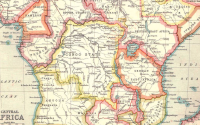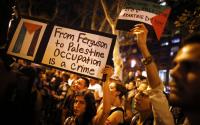Common Dreams / Published on Sunday, January 22, 2006 by the Associated Press Jon Sarche and Dan Elliott
The initials were spoken aloud only once all week, and then apparently by mistake. After this past week's testimony, any role the CIA had -- or didn't have -- in the interrogation of an Iraqi general who died in U.S. custody remains a tantalizing and mysterious backdrop to the court-martial of Army Chief Warrant Officer Lewis Welshofer Jr. The CIA is "the ghost at the banquet," said Eugene R. Fidell, an expert in military law who has been following the court-martial but doesn't know if the CIA was involved in the case. "We're playing 'Hamlet' without Hamlet here," said Fidell, an attorney in private practice who teaches military law at American University in Washington. He also represented news organizations in their attempts to open pretrial hearings in Welshofer's prosecution. Welshofer was convicted late Saturday of negligent homicide in the 2003 death of Republican Guard Maj. Gen. Abed Hamed Mowhoush at a detention camp in western Iraq. He could be dishonorably discharged and sentenced to up to three years and three months in jail at a hearing Monday. If convicted of the original murder charge, he could have been sentenced to life in prison. Prosecutors said Mowhoush was stuffed headfirst in a sleeping bag and bound with electrical cord, then suffocated with Welshofer sitting atop his chest. The defense had argued a heart condition caused Mowhoush's death, and that Welshofer's commanders had approved the interrogation technique. In 2004, the CIA said one of its officers may have been involved in Mowhoush's death, but the agency refused to elaborate. Last August, The Washington Post reported that documents it examined said Mowhoush was severely beaten by a CIA-sponsored Iraqi paramilitary group two days before he died. Testimony at Welshofer's court-martial this past week confirmed that Mowhoush was indeed beaten by Iraqis two days before he died. But the witness, Chief Warrant Officer Todd Sonnek, did not identify the Iraqis. Then defense lawyer Frank Spinner at one point questioned a witness whose identity is so secret that he was shielded from reporters and others by a green tarp suspended from the ceiling. The witness had said he was alarmed when Welshofer told him he thought the Army's interrogation guidelines were being broken every day. "And you didn't report it to the CIA?" Spinner asked. The attorney then stopped himself and quickly apologized to the judge. Spinner's apparent slip and the mystery surrounding that witness -- and others who have testified behind closed doors over the objections of the media -- were not the only indications of how sensitive the case is and how much remains secret. Welshofer testified that when he left the room where he was questioning Mowhoush, he "noticed other people in the hallway" and that they took control of the session. Welshofer said the Iraqis slapped and pushed Mowhoush, and the session escalated into a beating with rubber hoses after Mowhoush and one of the Iraqis recognized each other. During his testimony, Welshofer said commanders offered little guidance on how to question detainees. He said he received an e-mail from his unit's commanders saying there were no rules for interrogations because officials still had not determined how to classify detainees. The e-mail, sent as the insurgency was growing more lethal, claimed officers were "tired of taking casualties and that the gloves were coming off," he said. Each morning during the trial, two soldiers had wheeled in a locked box -- about 3 feet long, 2 feet wide and 1 foot high -- on a dolly. A security officer in a civilian suit and tie unlocks it and the attorneys pull out file folders and binders stamped "Secret" in large red letters. The security officer made sure the jurors, who were allowed to submit written questions for witnesses, didn't inadvertently reveal any secrets. At the end of each day, the materials were returned to the box, which was locked and wheeled out of court. In closing arguments, Spinner said soldiers were under pressure to come up with new interrogation techniques, and Welshofer believed he was doing the right thing to help save the lives of troops. Prosecutor Maj. Tiernan Dolan described a rogue interrogator who became frustrated with Mowhoush's refusal to answer questions and escalated his techniques to include beatings and simulated drownings until the general died. "He treated that general worse than you would treat a dog, and he did so knowing he was required to treat the general humanely," Dolan said.






